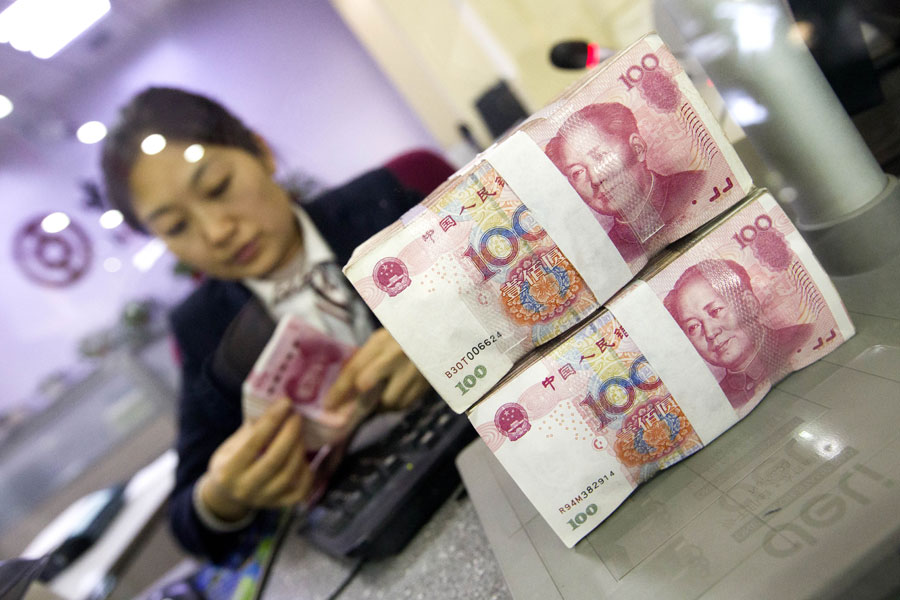Banking sector serves the real economy well


Growth in loans, bond investments confirms solid backing for key areas
The first-half performance of China's banking and insurance sectors confirms that they have continuously improved the quality and efficiency of their financial services in order to better serve the real economy, said regulatory officials on Wednesday.
Real economy refers to that part of the economy which produces goods and services.
Regulators also said commercial banks and insurers succeeded in keeping the overall risks under control in the first half.
Their remarks are borne out by first-half data. China's new yuan loans totaled 12.76 trillion yuan ($1.97 trillion), up 667.7 billion yuan year-on-year.
Banking and insurance institutions' new investments in bonds reached 3.4 trillion yuan, providing reasonable funding for the real economy, said Liu Zhongrui, deputy director of the Statistics, IT and Risk Surveillance Department of the China Banking and Insurance Regulatory Commission.
An increasingly larger amount of financial resources were directed to key areas and weak links of the economy, to give stronger support to micro and small businesses, rural revitalization, the manufacturing sector, technology innovation and the development of low-carbon businesses.
During the first six months, the growth of loans to the small businesses, whose total credit lines are up to 10 million yuan per borrower, stayed above 30 percent year-on-year.
By the end of June, loans to the manufacturing sector increased by 1.7 trillion yuan from the beginning of this year. Growth remained over 10 percent year-on-year for the last 14 months in a row, Liu said.
The banking sector also stepped up support for the transition to a green economy after China announced its goal to peak carbon dioxide emissions by 2030 and achieve carbon neutrality by 2060.
By the end of the first quarter, the outstanding balance of green lending offered by 21 major banks in the country amounted to 12.5 trillion yuan, accounting for 9.3 percent of total loans.
More than 70 percent of the green lending was given to green transportation, renewable energy, energy saving and environmental protection industries, said Ye Yanfei, an inspector of the CBIRC's policy research bureau.
It is estimated that the green lending of the 21 major banks will reduce the consumption of standard coal by over 300 million metric tons and cut carbon dioxide-equivalent emissions by more than 700 million tons a year, according to the CBIRC.
The banking sector will explore the opportunity of using a quota on carbon emissions as collateral for loans and mobilizing more private capital to invest in green assets via asset-backed securities, Ye said.
In the first half, China's banking sector effectively contained risks in key areas and the overall credit risk remained controllable. Its nonperforming loan ratio was 1.86 percent by the end of June, down 0.08 percentage point from the beginning of this year.
"The banking sector disposed of a historical record of 3.02 trillion yuan of nonperforming assets in 2020. It continued to dispose of 482.7 billion yuan of NPAs in the first quarter, which exceeded the amount of the same period last year. We expect that the figure of NPA disposal in the first half will also surpass that of the same period last year," Liu said.
He noted that China's economic recovery from the COVID-19 pandemic impacts is still uneven, and the foundation of recovery is not yet solid. Some enterprises, especially small businesses and individually-owned businesses, still have certain difficulties.
Owing to the lag effect of nonperforming exposures, the banking sector still faces the pressure of an increase in nonperforming loans, as China will exit the policy of deferring the payments on loan principal and interest for a number of micro, small and medium-sized enterprises.
"The CBIRC has urged banks to conduct comprehensive risk assessment, make sufficient provisions for loan impairment proactively, make plans for dealing with a rebound in nonperforming loans, and further ramp up efforts to dispose of NPLs. The regulator also supported banks to replenish capital through multiple channels to strengthen their risk resistance capacity," he said.




































